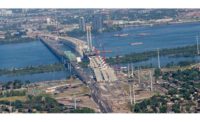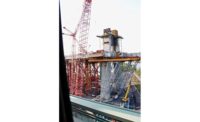Montreal Bridge Span Sprints Toward Completion

The private consortium building the replacement Champlain Bridge in Montreal aims to meet a Dec. 21 finish but is negotiating with government officials over scope.
PHOTO COURTESY INFRASTRUCTURE CANADA
Canada’s new infrastructure czar is facing one of his first major challenges as he seeks ways to avoid costly delays on the $3.1-billion Champlain Bridge replacement project in Montreal that is pushing to meet a Dec. 21 completion deadline. A recent report by Canada’s Auditor General said the Signature on the Saint Lawrence consortium, led by SNC-Lavalin Group, Spain-based ACS and Germany’s Hochtief, will likely miss the date, opening it up to fines of up to $300,000 a day and as much as $27 million over the first three months. But team compensation issues also are unsettled, after the new Liberal government in 2015 canceled bridge tolls.

François Philippe Champagne, named minister of infrastructure in a July cabinet shake-up, is exploring ways to speed up the St. Lawrence River span. A Parliament member and Canada’s former trade minister, he also had been senior counsel at ABB Group and strategic development director at AMEC Foster Wheeler. Champagne recently visited the bridge site and huddled with top management and said in a statement after the worksite inspection that he is “impressed by not only the progress of the work but also by the dedication of the workers.”
Champagne takes on his new role at a time when the federal government faces criticism over slower-than-expected progress on major infrastructure projects. Predecessor Amarjeet Sohi now is minister of natural resources, responsible for pushing along the stalled and controversial $7.4-billion expansion of the Trans Mountain pipeline in western Canada, whose purchase the government is about to complete. Sohi was likely tapped for the post in part because of political roots in Alberta.
Champagne’s office told Canadian Press earlier this month that 100% of earmarked federal funds have been committed for more than 4,200 projects, but 70% of projects had not yet claimed funding. He told Canada’s Globe and Mail newspaper in 2009 that he has “built the reputation as someone who could deliver.” Still, Champagne’s options to expedite the bridge may be limited, short of “throwing more forces” at the project, notes John Gamble, president and CEO of Canada’s Association of Consulting Engineering Cos., adding that “there is a cost to that.” A strike by crane operators across Quebec in late June also did not help progress, he says, adding “there is certainly a feeling that the Dec. 21 completion date is optimistic.”
The consortium, meanwhile, filed a $95-million suit last year, arguing it wasn’t given a heads-up early enough in the project schedule that loads would be limited on the existing bridge, more than a year after construction, say Canadian press reports. Restrictions on the old bridge, used to ferry construction material, created big complications by requiring water transport. “We have always said the biggest project challenge was the schedule,” says a consortium spokeswoman. “It is too early to determine the precise impacts of the crane operators’ situation … but we are doing a thorough analysis of the situation.”



